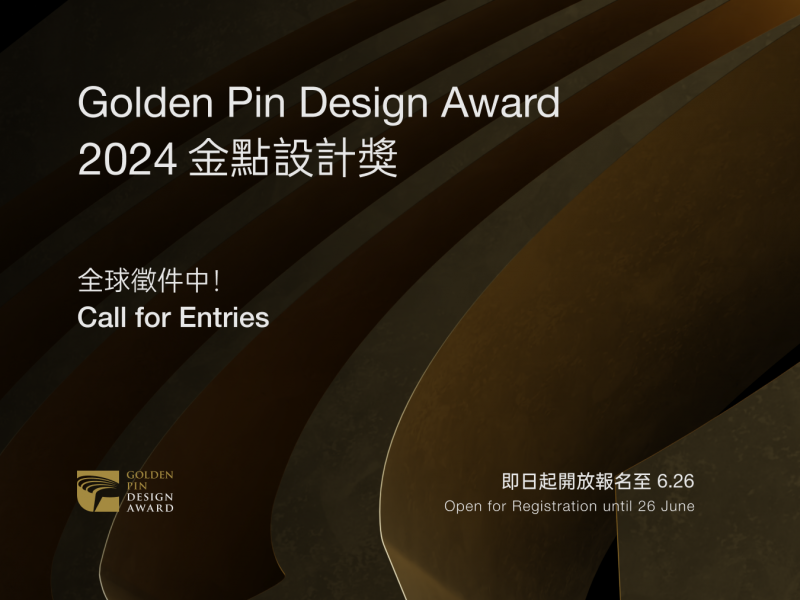The annual Golden Pin Design Award forum returned this December 5, staging talks from 4 international design luminaries at Songshan Cultural and Creative Park in Taipei. The theme of this year’s forum was ‘Design & Sustainability’, following on from last year’s theme ‘Design & Social Responsibility’. Hosted by prominent TVBS news anchor Lulu Hsia, the opening remarks came from the Chairman of Taiwan Design Center Chi-Yi Chang, who announced that this year’s Golden Pin Design Award and Golden Pin Concept Design Award had received nearly 8,000 entries from designers in 31 different countries and regions. “Every year we have a theme, but it always boils down to the social responsibility of designers,” he went on to say. “As a designer, I think we should contribute to a better future, or a better world.”

▲ The annual Golden Pin Design Award forum returned this December 5, staging talks from 4 international design luminaries at Songshan Cultural and Creative Park in Taipei.

▲ The forum was hosted by prominent TVBS news anchor Lulu Hsia.

▲ The opening remarks came from the Chairman of Taiwan Design Center Chi-Yi Chang.
With that it was time for the first of four keynote speakers, Managing Director of zlgdesign in Malaysia, Huat Lim who has worked with the likes of Zaha Hadid and Ron Herron. Having graduated from the prestigious AA School of Architecture in London, he co-founded zlgdesign with Susanne Zeidler in 1992, and went on to design several landmark projects including National Library Singapore. Lim’s talk was entitled “Beyond Sustainability: Biophilia and Productive Architecture”. The main idea of biophilia, he said, is to encourage harmony between people and nature by incorporating Mother Nature with sustainability in mind. Speaking of the mindset all designers should take when embarking upon a new project, he said, “We have one project called Planet Earth. We have only one chance and only one planet.”

▲ Malaysian architect Huat Lim shared his experiences and thoughts on “sustainability”.
Next up was Haruna Yamada and Hirokazu Kobayashi, the Japanese artist-designer duo known as SPREAD who served on the Golden Pin Design Award 2019 Final Selection jury. Both based in Tokyo and having graduated from Nagaoka Institute of Design, they combine specialisms in landscape design and graphic design. Their talk introduced SPREAD’s latest projects and design philosophy under the title, “Think the Past, Create the Future”. A particular point of pride for the pair, they said, is their work with sustainable and organic cosmetics brand Celvoke, in which they created designs for the brand’s first product launch five years ago, forsaking traditional styles and colors often associated with the organic product movement so as to stress the accessibility, rather than exclusivity, of the brand. “Being organic is something you can access every day. It should be a daily element,” said Yamada.


▲ The Japanese artist-designer duo SPREAD.
Third on stage was Italian architect and industrial design expert Luisa Bocchietto, who was president of the World Design Organization from 2017 to 2019, and served on the Golden Pin Design Award 2019 Final Selection jury. Having graduated from the school of architecture at Politecnico in Milano, Bocchietto was also president of the Industrial Design Association in Italy from 2008 to 2014. Her talk, “Design for humanity” sewed together thoughts on human centered design and sustainability. “Sustainability is the big criteria we use to decide if a design project is excellent or not,” she said, summing up the ideological legacy she imparted on the WDO. “Promoting real sustainable objects, this is our goal for the future. Before we worked for human needs. Now we need to work for humanity.”

▲ The Italian architect and industrial design expert Luisa Bocchietto.
Finally, all the speakers gathered on stage for a panel discussion, joined by award-winning designer Tony Chi, founder of the illustrious New York interior design firm tonychi. Chi, who also served on the Golden Pin Design Award 2019 Final Selection jury, harnesses the intangible allure of time and place in his design practice, and his wide-ranging portfolio includes iconic names from the Rosewood London to the Intercontinental Geneva, Andaz Tokyo, Park Hyatt Shanghai, Rosewood Hong Kong, and New York’s Carlyle Hotel.


▲ Tony Chi joined the panel discussion and talked about his perspectives on design and sustainability.
The panel discussion addressed the question of what designers can do to incorporate the idea of sustainability into their work. “I think speed has a lot to do with sustainability,” said Chi. “We tend to be in a hurry. When I was younger, I couldn’t resist to do more, and to do things quickly. Over the years I realized that we need not be in a hurry to get where we need to go. Between the two points is the most fascinating part.”











